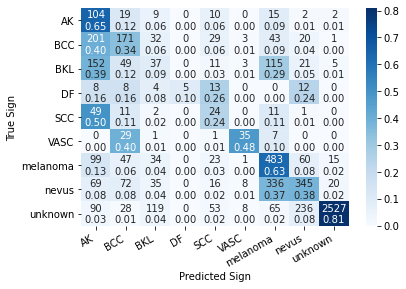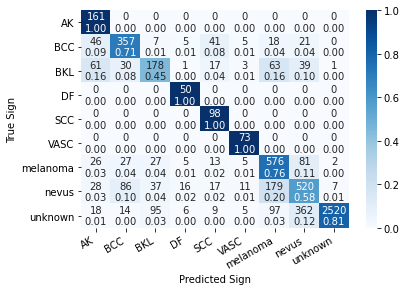Hi there! I am trying to train the classifier that consists of 9 labels. This is split into train, val and test. The value counts for each label in the training data is mentioned below. When I train the model even with a deep layered neural network, it doesn’t seem to change much. I have used Resnet 18-152, VGG16, alexnet, but it doesn’t give a high accuracy. I also don’t understand why each epoch’s accuracy is unpredictable. More number of epochs doesn’t seem to bring a big change in the accuracy either. I have also tried tuning the parameters in the optimizer but it doesn’t help as well. I am creating a flask application using this model but I can’t continue without finding the issue.
Epoch 0/24
----------
train Loss: 1.9129 Acc: 0.2992
val Loss: 1.2543 Acc: 0.6109
Epoch 1/24
----------
train Loss: 1.7522 Acc: 0.3500
val Loss: 1.0652 Acc: 0.6610
Epoch 2/24
----------
train Loss: 1.6867 Acc: 0.3759
val Loss: 1.0986 Acc: 0.6471
Epoch 3/24
----------
train Loss: 1.6434 Acc: 0.3972
val Loss: 2.9469 Acc: 0.5304
Epoch 4/24
----------
train Loss: 1.6174 Acc: 0.3987
val Loss: 1.6511 Acc: 0.4928
Epoch 5/24
----------
train Loss: 1.5869 Acc: 0.4187
val Loss: 1.2147 Acc: 0.6512
Epoch 6/24
----------
train Loss: 1.5569 Acc: 0.4254
val Loss: 1.1117 Acc: 0.6646
Epoch 7/24
----------
train Loss: 1.5612 Acc: 0.4304
val Loss: 0.9236 Acc: 0.6832
Epoch 8/24
----------
train Loss: 1.5131 Acc: 0.4396
val Loss: 1.0802 Acc: 0.6827
Epoch 9/24
----------
train Loss: 1.5151 Acc: 0.4396
val Loss: 1.0663 Acc: 0.6914
Epoch 10/24
----------
train Loss: 1.4907 Acc: 0.4433
val Loss: 0.9161 Acc: 0.6904
Epoch 11/24
----------
train Loss: 1.4973 Acc: 0.4532
val Loss: 1.3146 Acc: 0.6558
Epoch 12/24
----------
train Loss: 1.4802 Acc: 0.4537
val Loss: 1.0379 Acc: 0.6739
Epoch 13/24
----------
train Loss: 1.4678 Acc: 0.4531
val Loss: 1.1062 Acc: 0.6481
Epoch 14/24
----------
train Loss: 1.4542 Acc: 0.4602
val Loss: 1.0109 Acc: 0.6899
Epoch 15/24
----------
train Loss: 1.4302 Acc: 0.4687
val Loss: 0.8217 Acc: 0.7090
Epoch 16/24
----------
train Loss: 1.4087 Acc: 0.4782
val Loss: 0.9820 Acc: 0.6889
Epoch 17/24
----------
train Loss: 1.4056 Acc: 0.4847
val Loss: 1.0069 Acc: 0.6749
Epoch 18/24
----------
train Loss: 1.4144 Acc: 0.4670
val Loss: 0.8460 Acc: 0.7054
Epoch 19/24
----------
train Loss: 1.3993 Acc: 0.4872
val Loss: 0.9765 Acc: 0.6889
Epoch 20/24
----------
train Loss: 1.3896 Acc: 0.4889
val Loss: 0.8044 Acc: 0.7198
Epoch 21/24
----------
train Loss: 1.3591 Acc: 0.4913
val Loss: 0.8682 Acc: 0.6956
Epoch 22/24
----------
train Loss: 1.3473 Acc: 0.5065
val Loss: 0.8547 Acc: 0.7007
Epoch 23/24
----------
train Loss: 1.3593 Acc: 0.4918
val Loss: 0.9752 Acc: 0.6914
Epoch 24/24
----------
train Loss: 1.3354 Acc: 0.5024
val Loss: 0.8254 Acc: 0.7059
Training complete in 46m 18s
Best val Acc: 0.719814
Here is my classification report
precision recall f1-score support
AK 0.13 0.65 0.22 161
BCC 0.39 0.34 0.37 500
BKL 0.14 0.09 0.11 393
DF 1.00 0.10 0.18 50
SCC 0.13 0.24 0.17 98
VASC 0.60 0.48 0.53 73
melanoma 0.45 0.63 0.53 762
nevus 0.49 0.38 0.43 901
unknown 0.98 0.81 0.89 3126
accuracy 0.62 6064
macro avg 0.48 0.41 0.38 6064
weighted avg 0.70 0.62 0.64 6064
confusion matrix

value counts of each label in the training data
melanoma - 883
nevus = 889
bcc = 880
ak = 867
SCC = 628
unknown = 773
vasc = 253
bkl = 239
and here is my code
import numpy as np
import time
import copy
import os
import torch
import torch.optim as optim
import torch.nn as nn
import torchvision
import matplotlib.pyplot as plt
from torch.optim import lr_scheduler
from torchvision import datasets, models, transforms
import time
from tqdm import tqdm
import torch.nn.functional as F
from torch.nn.functional import relu
transforms = {
'train': transforms.Compose([
transforms.RandomResizedCrop(224),
transforms.RandomHorizontalFlip(),
transforms.ToTensor(),
transforms.Normalize([0.485, 0.456, 0.406], [0.229, 0.224, 0.225])
]),
'val': transforms.Compose([
transforms.Resize(256),
transforms.CenterCrop(224),
transforms.ToTensor(),
transforms.Normalize([0.485, 0.456, 0.406], [0.229, 0.224, 0.225])
]),
'test': transforms.Compose([
transforms.Resize(256),
transforms.CenterCrop(224),
transforms.ToTensor(),
transforms.Normalize([0.485, 0.456, 0.406], [0.229, 0.224, 0.225])
])
}
# generate the dataset and the loader
data_dir = '../input/data-final/data'
# image dataset are the ones that help in getting the image folder and the augmentation happening
image_dataset = {x: datasets.ImageFolder(os.path.join(data_dir, x), transform=transforms[x]) for x in ['train', 'val', 'test']}
# shuffling and loading the data to become the torch loader
dataloaders = {x: torch.utils.data.DataLoader(image_dataset[x], batch_size = 16, shuffle = True, num_workers = 4) for x in ['train', 'val', 'test']}
# getting the class names
class_names = image_dataset['train'].classes
# size of the data
data_size = {x: len(image_dataset[x]) for x in ['train', 'val', 'test']}
device = torch.device('cuda')
# create a model
def create_model(n_classes):
model = models.resnet152(pretrained=True)
n_features = model.fc.in_features
model.fc = nn.Linear(n_features, n_classes)
return model.to(device)
base_model = create_model(n_classes = 9)
# Load the model (Download only at first time loading the model)
# Define the function to train the model
def train_model(model, criterion, optimizer, num_epochs=25):
since = time.time()
best_model_wts = copy.deepcopy(model.state_dict())
best_acc = 0.0
for epoch in range(num_epochs):
print('Epoch {}/{}'.format(epoch, num_epochs - 1))
print('-' * 10)
for phase in ['train', 'val']:
if phase == 'train':
model.train()
else:
model.eval()
running_loss = 0.0
running_corrects = 0
for inputs, labels in dataloaders[phase]:
inputs = inputs.to(device)
labels = labels.to(device)
optimizer.zero_grad()
with torch.set_grad_enabled(phase == 'train'):
outputs = model(inputs)
_, preds = torch.max(outputs, 1)
loss = criterion(outputs, labels)
if phase == 'train':
loss.backward()
optimizer.step()
running_loss += loss.item() * inputs.size(0)
running_corrects += torch.sum(preds == labels.data)
epoch_loss = running_loss / data_size[phase]
epoch_acc = running_corrects.double() / data_size[phase]
print('{} Loss: {:.4f} Acc: {:.4f}'.format(
phase, epoch_loss, epoch_acc))
if phase == 'val' and epoch_acc > best_acc:
best_acc = epoch_acc
best_model_wts = copy.deepcopy(model.state_dict())
print()
time_elapsed = time.time() - since
print('Training complete in {:.0f}m {:.0f}s'.format(
time_elapsed // 60, time_elapsed % 60))
print('Best val Acc: {:4f}'.format(best_acc))
model.load_state_dict(best_model_wts)
return model
# Set the requires_grad on each parameter to false,
# so it will not calculate the gradients
# Set the new final layer for our new dataset
# Enable GPU for the model
# Set the loss function
criterion = nn.CrossEntropyLoss()
# Set the optimizer and the scheduler to update the weights, and train the model.
optimizer_conv = optim.Adam(base_model.parameters(), lr=0.001)
model_resnet = train_model(base_model, criterion, optimizer_conv, num_epochs=25)
Any support is appreciated.
